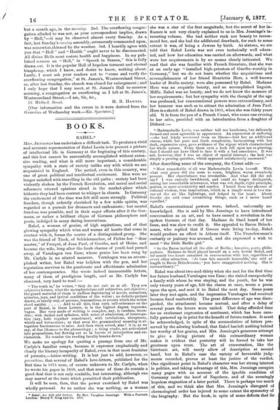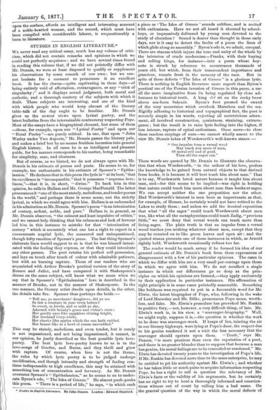BOOKS.
RAHEL.* MRS. JENNINGS has undertaken a difficult task. To produce a vivid and accurate representation of Rahel Levin is to present a picture of intellectual life in Germany at the beginning of this century, and this feat cannot be successfully accomplished without exten- sive reading, and what is still more important, a considerable sympathy with a state of society unlike any with which we are acquainted in England. The period, even in this country, was one of great political and intellectual excitement. Men were no longer satisfied with travelling in the old paths ; society had been violently shaken by the French Revolution, and moral and social reformers uttered opinions aloud in the market-place which hitherto they bad been content to whisper in closets. In Germany the excitement of the time was felt still more strongly. Political freedom, though ardently cherished by a few noble spirits, was regarded as a pursuit for dreamers and enthusiasts ; but mental freedom was possible, and in their eager efforts after it the Ger- mans, or rather a brilliant clique of German philosophers and poets, indulged in many daring innovations.
Rahel, a woman of genius, of high aspirations, and of that glowing sympathy which wins and warms all hearts that come in contact with it, forms the centre of a distinguished group. She was the friend of Tieck, of Schleiermacher, of Fichte her "dear master," of Fouque, of Jean Paul, of Goethe, and of Heine, and became the wife, long after the fresh charms of youth had passed away, of Varnhagen von Ense, whose praise has been sung by Mr. Carlyle in no stinted measure. Varnhagen was an accom- plished writer, but Rahel was helpless with the pen, and her reputation survives in the passionate and affectionate admiration of her contemporaries. She wrote indeed innumerable letters, many of them of prodigious length, and as Mr. Carlyle has observed, very hard to read
The truth is," he writes, "they do not suit us at all. They are subjective letters, what the metaphysicians call subjective, not objective; the grand material of them is endless depicturing of moods, sensations, miseries, joys, and lyrical conditions of the writer ; no definite picture drawn, or rarely any, of persons, transactions, or events which the writer stood amidst. Add to all this, that such self-utterance on the part of Rebel, in these Letters, is in the highest degree vaporous, vague. Her very mode of writing is complex, nay, is careless, incon- dite ; with dashes and splashes, with notes of admiration, of interroga- tion (nay, both together sometimes), with involutions, abruptness, whirls and tortuosities ; so that even the grammatical meaning is al- together burdensome to seize. And then when seized, alas I it is, as we say, of due likeness to the phraseology ; a thing crude, not articulated into propositions, but flowing out as in bursts of interjection and ex- clamation. No wonder the reading faculty breaks down."
We make no apology for quoting a passage from one of Mr.
Carlyle's familiar essays, because it expresses emphatically and clearly the literary incapacity of Rahel, even in that most feminine of pursuits,—letter-writing. It is but just to add, however, en parenthese, that several of Rahel's love-letters, published for the first time in 1874 were, of course unknown to Mr. Carlyle, when he wrote his paper in 1838, and that some of these do contain a good deal that is not only readable, but interesting, although one may marvel at the taste which permitted their publication.
It will be seen, then, that the power exercised by Babel was wholly personal. As an author she was nothing, as a woman
• Rand : tier Life and Letters. By Mrs. Vaughan Jennings. With a Portrait. London: Henry S. King and Co. 1876.
she was a star of the first magnitude, but the secret of her in- fluence is not very clearly explained to us in Mrs. Jennings's in- teresting volume. She had neither rank nor beauty to recom- mend her, and she had the additional drawback, for such to some- extent it was, of being a Jewess by birth. At sixteen, we are told that Rahel Levin was not even technically well educa- ted, and how her education was carried on afterwards, and what were her acquirements is by no means clearly intimated. We read that she was familiar with French literature, that she was- at an early age "installed high-priestess of Goethe-worship in Germany," but we do not learn whether the acquisitions and accomplishments of her friend Henrietta Herz, a well-known, • leader of Berlin society, were also possessed by Rahel. Madame Herz was an exquisite beauty, and an accomplished linguist. Mdlle. Rahel was no beauty, and we do not know the measure of her acquirements ; but her sympathy with the thought of the age was profound, her conversational powers were extraordinary, and her humour was such as to attract the admiration of Jean Paul. Here is a sketch of Rahel drawn in 1801, when she was thirty years old. it is from the pen of a French Count, who came one evening to her salon, provided with an introduction from a daughter of Diderot :—
" Mademoiselle Levin was neither tall nor handsome, but delicately formed and most agreeable in appearance. An expression of suffering —she had lately recovered from an illness—lent her an additionar charm, while her pure and fresh complexion, harmonising with her dark, expressive eyes, gave evidence of the vigour which characterised her whole nature. From these eyes a look fell upon me so piercing, that I should not have liked to face it with a bad conscience. It was not, however, that I was an object of special interest ; the look was simply a passing question, which appeared satisfactorily answered."
After describing some of the company, the Count adds :—
" Most remarkable of all was Mademoiselle Levin herself. With what easy grace did she seem to rouse, brighten, warm everybody present. Her cheerfulness was irresistible. And what did she not say? I was entirely bewildered, and could no longer distinguish, among her remarkable utterances, what was wit, depth, right principle, genius, or mere eccentricity and caprice. I heard from her phrases of colossal wisdom, true inspirations, which in a simple word or two tra- ver:ed the air like lightnings, and lodged in the heart. About Goethe she said some astonishing things, such as I never heard equalled."
Rahel's conversational powers were, indeed, universally ac- knowledged. She is said by Mrs. Jennings to have introduced. conversation as an art, and to have caused a revolution in the spoken German of that day. Madame de Staiil heard of her fame, and was slow to credit it. She appealed to Baron Brinck- mann, who replied that if Greece were living to-day, RaheL would produce an effect in Athens itself. The Frenchwoman's curiosity or jealousy was aroused, and she expressed a wish to- meet "the little Berlin girl."
"So the Baron invited all the elite of Berlin ; beauties, poets, philo- sophers. Madame de Steel placed herself on a sofa beside Rahel, and for nearly two hours remained in conversation with her, regardless of every other attraction. Je vous fais amende honorable,' she said at length to Baron Brinckmann; you have exaggerated nothing. She is extraordinary.'" Rahel was about two-and-thirty when she met for the first time her future husband,Varnhagen von Ense; she visited unexpectedly a family with whom he was staying, and the youth, for he was only twenty years of age, felt the charm at once, wrote a poem upon the spot, and sent it to Rahel the next day. Some years later they met again, and the impression Varnhagen had received became fixed unalterably. The great difference of age was disre- garded, the attachment became mutual, and after a delay of several years the lovers were united. That delay afforded time for an exuberant expression of sentiment, which has been care- fully garnered up in print for the benefit of future readers. It must be acknowledged, in spite of the accumulation of letters pre- served by the adoring husband, that Rahel has left nothing behind her worthy of her genius, and Mrs. Jennings's generous attempt to give a living picture of this extraordinary woman makes it evident that posterity will be forced to take her greatness upon trust. The art of conversation, like the histrionic art, will rarely allow of description at second hand, but in Rahel's case the variety of favourable judg- ments recorded, proves at least the justice of the verdict. One significant point in Rahel's character was her strong interest in politics, and taking advantage of this, Mrs. Jennings occupies many pages with an account of the ignoble condition of Germany under the hoof of Napoleon, and of the seemingly hopeless stagnation of a later period. There is perhaps too much of this, and we think also that Mrs. Jennings's disregard of chronological order has injured to some extent the symmetry of the biography. But the book, in spite of some defects that lie
upon the surface, affords an intelligent and interesting account of a noble-hearted woman, and the record, which must have been compiled with considerable labour, is unquestionably a boon to literature.










































 Previous page
Previous page